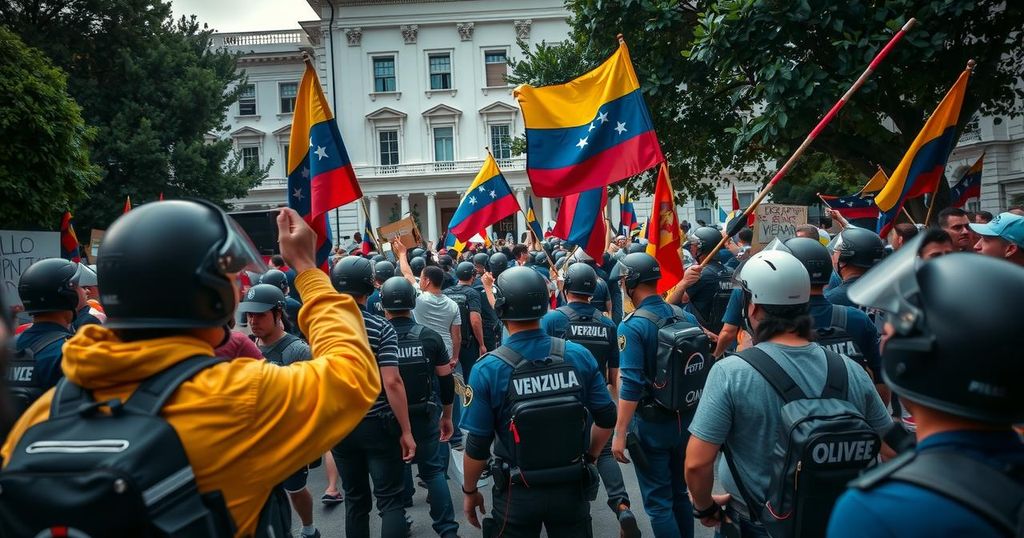Six Venezuelan government opponents at the Argentine embassy in Caracas denounced the presence of police and intelligence agents outside as harassment. The U.S. condemned the actions as a violation of international law, while Argentina’s Foreign Ministry called it a significant security disturbance. The incident follows rising tensions between the Venezuelan government and the opposition, particularly after calls for mobilization against President Maduro.
In Caracas, six Venezuelan government opponents who have sought refuge in the Argentine embassy expressed their concerns regarding the presence of local police and intelligence agents stationed outside their sanctuary for several hours. They condemned this act as harassment, prompting the U.S. government to label it a serious breach of international law. The Argentine Foreign Ministry echoed this sentiment, underscoring the disturbance caused by the military presence around the diplomatic mission.
The opponents primarily represent the Vente Venezuela party, led by former legislator María Corina Machado. The situation escalated shortly after Machado made an appeal for significant mobilization on December 1, leading to accusations from Venezuela’s minister of the interior, who alleged that Machado was involved in a conspiracy against President Nicolás Maduro. In their statements, Vente Venezuela reported that the embassy was devoid of electricity and surrounded by government vehicles, obstructing traffic and disrupting communication signals.
Argentina’s Foreign Ministry condemned the actions, recognizing them as a severe security disturbance and calling upon the international community to denounce this incident. The U.S. Embassy in Venezuela strongly condemned the harassment faced by asylum seekers, emphasizing the violation of international law and demanding that the Venezuelan regime honor its obligations by ensuring safe passage for those seeking asylum.
The backdrop of these events is marked by strained diplomatic relations between Venezuela and Argentina, which have deteriorated since 2019. The opposition members initially sought refuge in the embassy after facing arrest warrants for allegedly plotting to incite violence against the government. Tensions further escalated as Brazil was requested by Argentina to safeguard its embassy after Venezuela expelled Argentine diplomatic staff, leading to allegations of ambush tactics by the Venezuelan government against foreign embassies.
The current situation reflects the ongoing political crisis in Venezuela, where government opponents face significant persecution. The actions taken by Venezuelan authorities, including the stationing of police and intelligence agents outside the Argentine embassy, highlight the regime’s aggressive stance towards dissent. The tense diplomatic bonds between Venezuela, Argentina, and Brazil illustrate deeper geopolitical concerns involving human rights and asylum processes amidst a backdrop of alleged government violence and manipulation during elections.
In summary, the defiance of Venezuelan government opponents at the Argentine embassy illustrates the continuing struggle faced by dissenters under President Maduro’s regime. The international reaction, particularly from the U.S. and Argentina, highlights the serious implications of state-sanctioned harassment against individuals seeking asylum. These developments chronicle the broader themes of political repression and the challenges facing democracy in Venezuela.
Original Source: apnews.com







